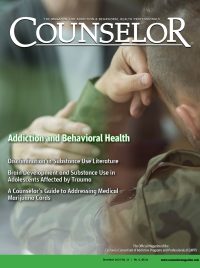Share
Safe and stable housing is critical to recovery from alcohol and drug use disorders. By providing housing and other support to individuals, recovery residences represent a vital component of a comprehensive and recovery-oriented system of care (Laudet & Humphreys, 2013; White, 2008). The COVID-19 pandemic may be particularly harmful to the physical health and well-being of those in recovery from alcohol and other drug disorders (Volkow, 2020), and among individuals in recovery from these disorders, those living in recovery housing may be particularly vulnerable (Mericle et al., 2020).
Recovery residences go by a variety of different names and can range from those based solely on mutual aid to those that also provide recovery support and other clinical services. Reviews of the evidence base for recovery housing consistently highlight positive outcomes (Reif et al., 2014), and findings to support recovery housing evidence-based practices are beginning to emerge (Mericle, Mahoney, Korcha, Delucchi, & Polcin, 2019). However, the field’s ability to generalize from this literature and maximize the benefits of it is limited because we lack a complete picture of the national recovery housing landscape (GAO, 2018).
To address these gaps, the National Study of Treatment and Addiction Recovery Residences (NSTARR) project will:
- Examine the availability of recovery housing in the US and characterize environments where recovery residences are located
- Characterize the national recovery housing landscape in terms of organizational and residence characteristics, policies and practices, programming, and service delivery orientation to explore whether these characteristics vary depending on where residences are located
- Identify underlying patterns among recovery residences and examine the association between these patterns and existing categorizations of treatment and recovery housing
- Explore key residence characteristics associated with recovery housing evidence-based practices
Researchers on this four-year, National Institutes of Health (NIH)-funded study will consult with a diverse group of experts in the treatment, recovery, housing, and recovery housing fields to create a national database of recovery residences and survey of a random sample of eight hundred residences stratified by state. All residences in the database will be geo-located and linked with contextual information, including US Census data, alcohol and drug treatment availability, community health and housing services, alcohol outlets, and crime statistics to map key risk and recovery resources. The survey will collect critical data on organizational and residence features, policies and practices, programming, and service delivery orientation to illustrate essential features of recovery housing and to delineate different types of it.
To address the unique challenges that COVID-19 may pose to recovery residences and those operating them, researchers were recently awarded funding to add questions to the survey administered to residences participating in the NSTARR project, querying the extent to which the COVID-19 pandemic has affected sources of revenue for the residence, policies and practices, and programming for residents. An additional two hundred randomly sampled residences (stratified by the US Census Division) will be asked to complete a COVID-19-specific survey that will collect information on implementation of COVID-19 guidance to ensure resident and staff safety. These residences will also be resurveyed six and twelve months later to track changes over time. Finally, operators of residences that are no longer open will be asked to participate in a semi-structured interview about the role that COVID-19 may have played in residence closure.
Recovery housing is undervalued and underfunded relative to other components of the substance use continuum of care, largely due to lack of information about what it is and what it can do for individuals in recovery. Taken together, this research represents the most comprehensive study of recovery housing to date. It will both literally and figuratively put recovery housing on the map, highlighting its place within a range of services needed and used by individuals in recovery.
References
- Laudet, A. B., & Humphreys, K. (2013). Promoting recovery in an evolving context: What do we know and what do we need to know about recovery support services? Journal of Substance Abuse Treatment, 45(1), 126–33.
- Mericle, A. A., Mahoney, E., Korcha, R., Delucchi, K., & Polcin, D. L. (2019). Sober living house characteristics: A multilevel analyses of factors associated with improved outcomes. Journal of Substance Abuse Treatment, 98, 28–38.
- Mericle, A. A., Sheridan, D., Howell, J., Braucht, G. S., Karriker-Jaffe, K., & Polcin, D. L. (2020). Sheltering in place and social distancing when the services provided are housing and social support: The COVID-19 health crisis and recovery housing. Journal of Substance Abuse Treatment, 119, 108094.
- Reif, S., George, P., Braude, L., Dougherty, R. H., Daniels, A. S., Ghose, S. S., & Delphin-Rittmon, M. E. (2014). Recovery housing: Assessing the evidence. Psychiatric Services, 65(3), 295–300.
- US Government Accountability Office (GAO). (2018). Substance use disorder: Information on recovery housing prevalence, selected states’ oversight, and funding. Retrieved from https://www.gao.gov/assets/700/690831.pdf
- Volkow, N. D. (2020). Collision of the COVID-19 and addiction epidemics. Annals of Internal Medicine, 173(1), 61–2.
- White, W. L. (2008). Recovery management and recovery-oriented systems of care: Scientific rationale and promising practices. Retrieved from http://www.williamwhitepapers.com/pr/2008RecoveryManagementMonograph.pdf
About Me
Jason Howell, MBA, PRSS, RSPS, PSS, is the executive director of RecoveryPeople. He is in MH/SUD recovery and serves as a senior consultant on the NSTARR and COVID supplement projects.
Laya Cooperman, MPH, assisted in the development of this article while she served as the project coordinator on the NSTARR Project.
Deidre Patterson, MPH, MAS, is a research associate scientist in the Alcohol Research Group at the Public Health Institute. She conducts geospatial analyses on the NSTARR and COVID supplement projects.
Amy A. Mericle, PhD, MSW, is a research scientist in the Alcohol Research Group at the Public Health Institute and the principal investigator on the NSTARR and COVID supplement projects.












 Counselor Magazine is the official publication of the California Association of Addiction Programs and Professionals (CCAPP). Counselor offers online continuing education, article archives, subscription deals, and article submission guidelines. It has been serving the addiction field for more than thirty years.
Counselor Magazine is the official publication of the California Association of Addiction Programs and Professionals (CCAPP). Counselor offers online continuing education, article archives, subscription deals, and article submission guidelines. It has been serving the addiction field for more than thirty years.